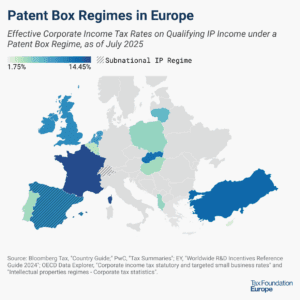
Wartime Taxes Are Waging War on Sound Policy Choices
6 min readBy:Even though energy prices have declined from their recent peak, Spain is one of the few countries in Europe continuing to rely on windfall profits taxes to fund relief measures for consumers. Spain also did not limit the scope of the windfall taxes to fossil fuel or energy companies like most of its European counterparts, but instead extended them to cover the banking sector as well. Though the two windfall taxes expire at the end of 2024, Spain’s central government is considering making both taxes permanent, or at least the windfall taxA tax is a mandatory payment or charge collected by local, state, and national governments from individuals or businesses to cover the costs of general government services, goods, and activities. on the banking sector.
Windfall profits taxes are intended to target extraordinary profits created by extraordinary circumstances, but that’s not how Spain is using them. Spain’s approach seems to be to make them permanent, special taxes that do not reference profitability at all. This will likely backfire, hurting Spain’s economic growth. Instead, Spain should raise revenue through more neutral tax policies that make room for the additional investment needed to support growth.
Historically, windfall taxes have targeted oil and energy companies when costs have risen, especially from war or other crises. In the case of Spain, the first windfall tax was introduced in January 1939 under Francisco Franco at the end of the Civil War. The tax, ranging from 30 percent to 80 percent, applied to both individuals and companies independently of their sector of activity.
Windfall Tax on Fossil Fuel Deterring Green Investments
In the 21st century, Spain is again one of the early adopters of windfall taxes in Europe. In 2021, Spain implemented a temporary mechanism to tax excess revenues of energy companies that benefited from higher energy and gas wholesale prices. However, over time, a series of exclusions were approved, and many energy providers were left outside the scope of the mechanism.
In October 2022, to homogenize the myriad of windfall taxes European countries had implemented, the Council of the European Union agreed to impose an EU-wide windfall profits taxA windfall profits tax is a one-time surtax levied on a company or industry when economic conditions result in large and unexpected profits. Historically, such taxes have targeted oil and energy companies when costs have risen, especially from war or other crises. , or “solidarity contribution,” on fossil fuel companies (oil, gas, coal, and refining sectors) whose revenue would then be used to partially offset households’ high energy bills “in a non-selective and transparent measure supporting all final consumers.”
Since the regulation allowed the Member States to apply either a solidarity contribution or an equivalent national measure to the surplus profits of the fossil fuel industry in the fiscal year 2022 and/or 2023, Spain chose to implement its own windfall tax.
In December 2022, Spain adopted a new windfall profits tax on the largest operators engaged in activities related to crude oil or natural gas production, coal mining, and oil refining. However, the tax differs greatly from the EU-wide windfall tax.
First, the Spanish approach uses net turnover as the tax base instead of taxable profits. A tax rate of 1.2 percent applies to the sales of domestic power utilities. This means the tax baseThe tax base is the total amount of income, property, assets, consumption, transactions, or other economic activity subject to taxation by a tax authority. A narrow tax base is non-neutral and inefficient. A broad tax base reduces tax administration costs and allows more revenue to be raised at lower rates. is not designed to tax profitability, whether the profits are windfall or not. Instead, it resembles more of an excise taxAn excise tax is a tax imposed on a specific good or activity. Excise taxes are commonly levied on cigarettes, alcoholic beverages, soda, gasoline, insurance premiums, amusement activities, and betting, and typically make up a relatively small and volatile portion of state and local and, to a lesser extent, federal tax collections. .
Second, it only applies to companies with an annual turnover exceeding €1 billion in 2019.
Third, the tax applies through the fiscal years 2023 and 2024, while the EU regulation imposed a temporary windfall tax that would end after 2023.
Overall, the Spanish design deviates from both the temporary nature of the contribution and the prescribed tax base that the EU mandated.
After the approval of the EU-wide windfall tax, the Spanish government vowed to adjust its windfall tax to the EU design. However, no amendments were introduced. Since Spain refused to change its tax base from net turnover to taxable profits, the largest electricity companies filed a motion with Spain’s High Court claiming that the new tax was “discriminatory and unjustified.” Spanish companies announced that they would accept paying a tax on the windfall profits generated from the natural gas business but not a tax on all domestic revenue.
In a 2023 report, the European Commission proposed to end these measures as the “diverging implementation strategies across Member States have reportedly led to significant investor uncertainty.” Although the EU regulation clearly states that windfall profits taxes should be a temporary mechanism and “the duration of the measure should be limited and tied to a specific crisis situation,” Spain announced in 2023 (through a government coalition agreement) that it planned to make permanent the two windfall taxes (both on energy and the banking sector). One of Spain’s biggest oil producers criticized this policy for creating a challenging investment environment as it considered where to locate its green hydrogen business.
On December 3rd, 2023, the government again announced that it planned to review the energy windfall tax during the 2024 budget approval, but a budget for 2024 was never presented for discussion. At the end of December 2023, the windfall taxes were extended through 2024.
These windfall taxes are taking capital away from more carbon-intensive energy production, but they are also removing greatly needed capital from the companies that are investing in clean energy. Additionally, apart from reducing investment, windfall profits taxes can accelerate the decline of domestic oil and gas production, reducing the country’s energy security.
While the windfall tax on energy companies collected only €1.2 billion in 2024 and a similar amount in 2023, the Spanish government announced that €0.8 billion of EU funds would be invested in Spanish companies to develop green hydrogen plants. After lengthy procedures of soliciting and complying with the entire requirement to apply for EU funds, the Spanish companies might be able to recuperate up to one-third of the total amount they paid in windfall taxes (in 2023 and 2024) and invest it in the green energy projects that got stalled due to the windfall tax.
A Windfall on Your Mortgage
Spain’s windfall tax also covers the banking sector. It uses a bank’s net interest income and net fees (if the net income from these sources exceeded €800 million in 2019) as the tax base. The tax rate is 4.8 percent, applicable for the years 2023 and 2024.
As with the energy sector, this tax is not designed to tax profitability (windfall or not).
The windfall tax on the banking sector can increase loan interest rates and reduce the amount of available capital, restricting banks’ capacity to respond to an unforeseeable financial crisis. In the event of a recession, a rise in loan defaults would negatively impact bank profits. The European Central Bank (ECB) objected to Spain’s windfall tax on banks as it could reduce credit supply and banks’ resilience in an economic downturn.
Spanish banks have also become reluctant to increase their exposure to Spanish government debt (loans and bonds).
Maintaining this tax, or making it permanent as the Spanish government recently announced, would likely raise interest rates, further hit banks that are already not profitable, distort competition in the banking sector, increase litigation, and punitively target certain industries because the tax base is poorly designed.
Rather than pursuing arbitrary and temporary policies that weaken sectors and endanger investment projects, policymakers should implement long-term, pro-growth tax reforms that stimulate economic activity, strengthen the financial sector, and incentivize energy diversification by supporting private investment through full expensingFull expensing allows businesses to immediately deduct the full cost of certain investments in new or improved technology, equipment, or buildings. It alleviates a bias in the tax code and incentivizes companies to invest more, which, in the long run, raises worker productivity, boosts wages, and creates more jobs. .
Share this article




